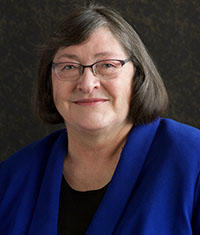Dean Emeritus Speedie pens new College of Pharmacy history book

Dr. Marilyn K. Speedie was dean of the University of Minnesota College of Pharmacy from 1996-2017, when she began her phased retirement that ended in 2020. During her tenure as dean, Speedie increased the admission rate of the College of Pharmacy by expanding the program to the University of Minnesota, Duluth campus, formed the College of Pharmacy’s Center for Leading Healthcare Change, and built a national presence for the program through service.
Larry Weaver, the dean of the College of Pharmacy from 1966-1984 and interim dean from 1994-1996 created the Wulling Endowment so the history of the college could be recorded. At the time the endowment was made, the recorded history ended in 1968.
Weaver understood the importance of having the history of the college represented so that people would know the college’s purpose and values, as well as what made it special.
With his encouragement to start the story, Speedie and the college were able to set up a committee and hire Lee Anderson and Kathy Penningroth from Iowa to write the story.
Anderson and Penningroth created a product rich with facts and data that sought to parallel the development of the profession and health care with the development of the college. While this was a valid and valued approach, Speedie also wanted to incorporate stories, photos, and other elements to make the story more readable and enjoyable.
As Speedie was nearing her retirement, one of her goals was to finish this history through her term. “I felt that the history had to be completed. It was Larry Weaver’s mandate, but I think the same reasons that drove him to ask that the history be written are the same purposes I had,” said Speedie.
Additionally, Speedie wants alumni to read about the period in which they were a student at the college as a way to value where they graduated from and become closer to the college.
“I think that if you appreciate what it is that makes us special, then that is what you are going to engage in and value as you go forward”
Although it is widely understood that the college is highly ranked and highly respected, many may not know what specifically makes the college so special. Through the recounting of the college’s history, Speedie wants people, especially the current and future students, faculty, administration, and alumni, to understand what it is that makes the University of Minnesota College of Pharmacy so unique.
For Speedie, it is important to know what the college is embracing as mission and values that sets it apart from other programs. By understanding the roles of leadership, innovation and discovery, outreach, and diversity in the college, the history of these values can be carried forward to the future.
“I think that if you appreciate what it is that makes us special, then that is what you are going to engage in and value as you go forward,” said Speedie.
One of the most interesting parts of the college’s history for Speedie to learn about while writing the book was the college’s beginning with Frederick Wulling, the first dean from 1892-1936. Wulling and other deans in the Midwest were responsible for bringing science to the curriculum and profession. This group was able to lead pharmacy to higher standards and to a scientifically-based profession. For Speedie, it was remarkable to learn that land-grant institutions in the Midwest had strong scientific deans who were able to elevate the quality of education and the field from an apprenticeship or two-year program to a four-year, bachelor’s of science degree. Despite having limited resources, Wulling was able to lead the creation of a successful, scientific program because of his mission to serve all Minnesotans in a practical and professional manner.
By understanding the history of the college, Speedie hopes students will learn that if they are resilient and willing to create change where change is needed, they will be able to survive the ups and downs they will go through in life.
“If you graduate from this college, you are expected to accept personal responsibility for change. If you see a problem you should not just let it go. If you see a problem, no matter if you are a formal leader, an informal leader, or a grassroots leader, you have personal responsibility to lead change, even if you are called a malcontent,” said Speedie.
A History of the University of Minnesota College of Pharmacy, 1892-2017 is available for purchase at lulu.com. The book costs $16.99 for a softcover copy or $23.99 in hardcover. The college is tentatively planning a book signing sometime this fall.